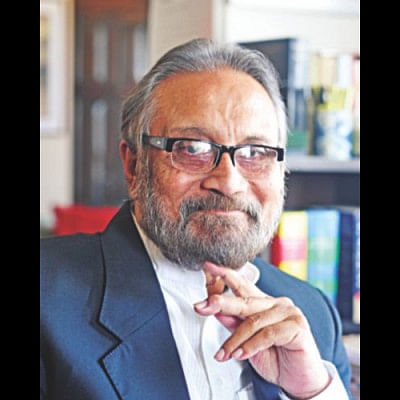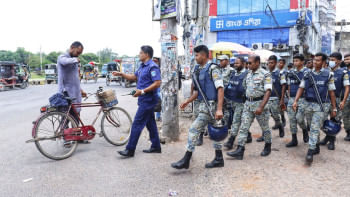Twenty-fifth and after!

Things were very tense through the month of March of Nineteen Seventy-one in the then East Pakistan. President Yahya Khan of Pakistan left Dhaka on the night of the third of March leaving a dialogue with Bangabandhu inconclusive. Through the month of February Pakistanis feigned to carry on with a dialogue with Bangabandhu Sheikh Mujib and his team, eventually betraying the Bengali nation, and came down on them, armed to the teeth, on the night of the 25th of March. Hundreds of thousands were annihilated in a matter of a couple of hours.
Between the 1st of March and the 25th we used to congregate in a room at the Science Annexe Building opposite Bhasha Shaheed Minar (Language Martyrs Monument) and watch the patriotic musical and dance soirees staged at the Shaheed Minar. On 25th March we were at the same place and observed that the happenings at the Shaheed Minar had stopped all on a sudden to be replaced by an uncanny silence. When we were wondering about the reason Balai came down from his canteen and told us that we should best be leaving as there was rumour about a possible crack-down by the Pakistan army later that night. We presumed that this rumour had caused early closure of the cultural programme at the Shaheed Minar.
We then decided to go to the Iqbal Hall, now known as the Zahurul Huq Hall, to enlighten us further on the rumour in my battered Volkswagen Beetle. Most student leaders used to live in the Iqbal Hall in those days. On way to the Hall we saw two truck-loads of Pakistan army soldiers busy removing a tree trunk earlier placed as a barrier in front of the Rokeya Hall for women. We were amazed because since the 1st of March the Pakistan army were not to be seen in the city. We assumed that everything was not alright. We were worried that, may be, a serious catastrophe was impending for the Bengali nation.
No one at the Iqbal Hall had any knowledge about the situation. Frustrated, we decided to head for Bangabandhu's residence in Dhanmondi. His residence bore a desolate look. No one could be found to answer our queries. The guard said that the leader had a meeting with the important politicians belonging to his party and they were told that the talks with the Pakistanis had failed. This apparent development was not unforeseen. We started back for our homes with apprehension about mishaps that might follow. At the Eskaton Road-Outer Circular road intersection there is a small restaurant, not so classy, called Café Taj. We, from our days in the college, used to go to that restaurant usually at the end of the day to exchange notes, political or otherwise, at the end of the day over cups of sugary milk tea and, occasionally, some inexpensive chicken polao. On the night of the 25th we also had a plan to go there. But with the sudden turn of events we were really de-motivated to spend time outside of our homes. So I dropped my friends off at Moghbazar and drove towards home. I used to live in Rajarbag with my brother and my sister-in-law in those days. On reaching home I barely had a shower when sounds of a commotion came from the main road. We were located in a lane about fifty yards from the main road. I rushed to the spot and saw that many residents of the area had come down there and were chanting Joy Bangla, the slogan closest to the Bengali hearts. The armed policemen in civilian clothes were there trying to dissuade the people from being agitated. They were saying that the Pakistan Army had hit the roads and were advancing towards Rajarbag police lines and Peelkhana garrison of the East Pakistan Rifles to disarm them. They said that they would not surrender and fight to the last. Presence of unarmed civilians on the road would only make their job difficult. So all of us went back home. In matter of minutes, shots from small fire arms and the sound of advancing tanks could clearly be heard. Until then we had no idea about what was going to follow.
Within half an hour heavy guns came down blazing on Rajarbag barracks. The tanks had surrounded the Police lines. All members of the Police force were confined within the barracks. They tried to retaliate as best as they could. But against an organized aggression with all modern arms and weapons the retaliation with mostly non-automatic arms seemed feeble. Within a short time, the barracks caught fire. Such was the size of the fire that we seemed to be roasted in its heat in our homes. We covered ourselves with wet towels but the towels dried up in minutes in the heat of this all engulfing fire. Towards three or four in the morning the fire started dying down. By then the incessant firing of all sorts by the army had stopped and the sounds of lone shots now and then from the police lines had subsided. We were not sure if we were still safe. The movement of tanks and armoured vehicles from the main road could still be heard. When the sky in the east became lighter there was a knock on our front door. Worry of intrusion by the marauders overtook us. There was a gap and another knock. I approached the door with apprehension and asked "Who is that?" A pause and then someone whispered, "Brother I am a policeman from Rajarbag." I opened the door and saw two men in their loin cloth standing there with rifles in their hands. They said that they had run out of bullets and a lot of their comrades had died in this uneven battle. They asked me to conceal the rifles wherever I could. "We shall come back and fight again," they said and melted in the darkness of night. An eerie silence took over. I did not know what to do with the rifles. The sky in the east was fast becoming lighter. Soon rays of the sun brightened up the atmosphere. It dawned on me that I had a duty to do. There was a pond right behind our house. I threw the arms in the middle of the pond knelt down, and started crying aloud like a child.

 For all latest news, follow The Daily Star's Google News channel.
For all latest news, follow The Daily Star's Google News channel. 



Comments